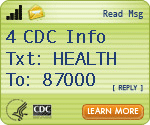Content on this page was developed during the 2009-2010 H1N1 pandemic and has not been updated.
- The H1N1 virus that caused that pandemic is now a regular human flu virus and continues to circulate seasonally worldwide.
- The English language content on this website is being archived for historic and reference purposes only.
- For current, updated information on seasonal flu, including information about H1N1, see the CDC Seasonal Flu website.
Site last updated August 11, 2010 1:00 PM ET
Situation Update
 The U.S. Public Health Emergency for 2009 H1N1 Influenza expired on June 23, 2010. On August 10, 2010, the World Health Organization (WHO) International Health Regulations (IHR) Emergency Committee declared an end to the 2009 H1N1 pandemic globally. For information about CDC’s response to the 2009 H1N1 pandemic, visit The 2009 H1N1 Pandemic: Summary Highlights, April 2009-April 2010. Internationally, 2009 H1N1 viruses and seasonal influenza viruses are co-circulating in many parts of the world. It is likely that the 2009 H1N1 virus will continue to spread for years to come, like a regular seasonal influenza virus.
The U.S. Public Health Emergency for 2009 H1N1 Influenza expired on June 23, 2010. On August 10, 2010, the World Health Organization (WHO) International Health Regulations (IHR) Emergency Committee declared an end to the 2009 H1N1 pandemic globally. For information about CDC’s response to the 2009 H1N1 pandemic, visit The 2009 H1N1 Pandemic: Summary Highlights, April 2009-April 2010. Internationally, 2009 H1N1 viruses and seasonal influenza viruses are co-circulating in many parts of the world. It is likely that the 2009 H1N1 virus will continue to spread for years to come, like a regular seasonal influenza virus.
See More on Past H1N1 Updates »
Vaccination
CDC recommends a yearly flu vaccination as the first and most important step in protecting against the flu. The U.S. 2010-2011 seasonal influenza vaccine will protect against an H3N2 virus, an influenza B virus, and the 2009 H1N1 virus that emerged last year to cause the first global pandemic in more than 40 years and resulted in substantial illness, hospitalizations and deaths. Seasonal 2010-11 vaccine has begun shipping from manufacturers and CDC recommends that everyone 6 months and older get a 2010-2011 flu vaccine for the upcoming season as vaccine is available.
Other 2009 H1N1 Flu Topics
Diagnosis
How the illness is diagnosed, recommendations for lab testing…
Infection Control
Healthcare guidance, occupational safety, facemasks & respirators…
Antivirals/Treatment
Use of Tamiflu and Relenza for treatment or prevention of H1N1 flu…
Emergency Use Authorization
Info about CDC-requested & FDA-issued EUA drugs & devices…
What You Can Do to Stay Healthy
- Get vaccinated against seasonal and 2009 H1N1 flu. Vaccination is the best protection we have against flu. CDC is now encouraging everyone to get vaccinated against 2009 H1N1. The vaccines to protect against 2009 H1N1 are widely available. Supplies of seasonal flu vaccine may be limited. Find a vaccine
- Influenza is thought to spread mainly person-to-person through coughing or sneezing of infected people.
- Take everyday actions to stay healthy.
- Cover your nose and mouth with a tissue when you cough or sneeze. Throw the tissue in the trash after you use it.
- Wash your hands often with soap and water. If soap and water are not available, use an alcohol-based hand rub.
- Avoid touching your eyes, nose and mouth. Germs spread that way.
- Stay home if you get sick. CDC recommends that you stay home from work or school and limit contact with others to keep from infecting them.
- Follow public health advice regarding school closures, avoiding crowds and other social distancing measures.
- Stay informed. This website will be updated regularly as information becomes available.
- Call 1-800-CDC-INFO for more information.
Get email updates
To receive weekly email updates about this site, enter your email address:
Contact Us:
- Centers for Disease Control and Prevention
1600 Clifton Rd
Atlanta, GA 30333 - 800-CDC-INFO
(800-232-4636)
TTY: (888) 232-6348 - Contact CDC-INFO



